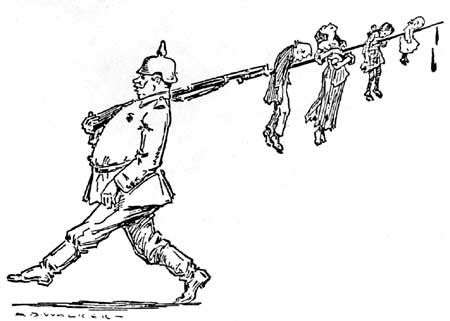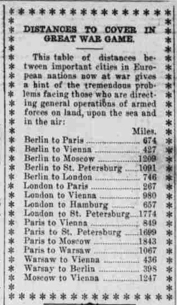by Richard van Pelt, WWI Correspondent
War dominated the front page. Names and geography new to readers had to be explained:
KAISER CALLS OUT ANOTHER MILLION TO RESIST FRENCH
Belgium. – History’s greatest battle between Germans on one side and Belgians, French and English on the other was expected in Belgium in a few days.
The allies were concentrated at Namur.
The Germans, in occupation of Liege city, awaited reinforcements and supplies.
The Liege forts remained in the Belgian’s hands, despite the city’s loss.
There was much skirmishing throughout the country, the Belgians declaring they and their allies were driving the Germans back.
Reports were current of German cruelties on civilians, but as they were circulated by Germany’s enemies, there were taken with a grain of salt.
Allegations of German atrocities became a major propaganda theme throughout the war. The atrocities, which have come to be known as the “Rape of Belgium” and the theme was used extensively to inspire support for the war. During the opening weeks of the war, German troops expected resistance by civilians, as they experienced from the franc tireurs during the Franco-Prussian war. War crimes did take place, but not to the extremes exploited by the press and by the allied governments.

The front page also reported the funeral service of President Wilson’s wife, Ellen Axon Wilson.
Though Germany and Austria-Hungary “were in arms together,” the paper reported, “the actual declaration of hostilities was considerably delayed, and none has even yet been exchanged between Austria and England, which, like France, is at war with Germany.” The paper reported that the actual declaration of war “was not forthcoming until a strong body of Austrian troops had been massed along the Swiss frontier, obviously in readiness to attach the French forces which invited Alsace.”
The United States was not at war, but as the headline notes, “War In Europe Will Cause War Tax Here.” The United States depended heavily on tariffs and the lack of imports resulted in an immediate falling off of revenue. Though in recession at the outbreak of the war, the United States entered into a near four year boom as Europeans began purchasing American goods for the war and later as prepared for and joined the battle.
Page 2 headlines also focused on the outbreak of war:
Battle Has Begun That Will Decide Fate of Alsace
Workingmen Will Try To Stop the War
Austrians Beaten By Montenegrins
Russia Has Army Nearly Mobilized
French Censorship Still More Strict
Balkan War May Break Out Again
Crossed Pacific Saw No War Vessels
Japan In It Soon
The paper reported that the war “May Stir Switzerland.” “The Austrian 14th army corps, 30,000 strong and under the Grand Duke of Tuscany’s command,” the paper erroneously reported, ”had arrived today at Basel, Switzerland from the Tyrol, to help the Germans, according to war office advices here. Though no definite statement to that effect was made in the messages, it was clear that this had involved a violation of Swiss neutrality.” Though not a belligerent, Switzerland maintained a state of armed neutrality.
For the over 600 residents of Marion County of Swiss birth or descent, neutrality did not necessarily offer any comfort during the opening months of the war. Switzerland, the Netherlands, Sweden, Spain, and Norway remained neutral. During the opening months of the war, Switzerland feared that they, like Belgium, would be invaded as part of a strategy to consolidate the fronts. Neutral states often profited from trade with the belligerents, but this ended in 1916 as the war began to have negative effects on the neutral powers. This took the effect of inflation, shortages of food and raw materials, and of civil unrest.
Neutral states had duties set out in the 1907 Hague Agreement, which permitted a neutral to export goods to the belligerents, including arms. Wounded or sick soldiers could travel through a neutral state, but other troops from either side were not allowed to enter the country. The Neutral states could not join a military alliance and had to treat all states equally in diplomatic relations. Neutral citizens could enlist in the forces of a belligerent, but belligerent powers were prohibited from recruiting troops in neutral states.
Locally, the paper reported at total expenses for one year at the Oregon Agricultural College (now Oregon State University) would cost two hundred and twenty four dollars. This included tuition, room and board, books, and fees. In today’s dollars that would equate to five thousand two hundred and forty dollars. The university’s website indicates that the average undergraduate could expect tuition, room and board, and fees to average $23,658 for the 2013-2014 school year.
The editor commented on the courage of the German soldier before the fortresses of Liege:
The German soldier at Liege is showing, as he always has shown, the most splendid courage. He has gone bravely up to almost certain death and driven back by a veritable hell of shot and shell leaving his comrades by the hundreds upon the field, has again and still again gone back into the seething cauldron of death with a courage sublime in its very deliberateness. Men in excitement, nerved by the flush of victory, will do and dare much, but the deliberate trying again and again to wring victory from desperate defeat on an apparently hopeless field requires bravery of the very highest type, the type that, understanding its risks, takes them coolly and deliberately in the line of duty. The world has never shown a more desperate and deadly conflict than that at Liege, where human odds, plunged into the raging hell of battle with a the flower of the German army, struggling against super-bravery seldom equaled and never excelled, and charged again and again until the fortress finally yielded to their assaults. It is pitiful that such men should be cut down in the prime of life, and that their progeny should be lost to the world.








For some rare German film footage taken at the start of the war, copy to your browser: http://www.westernfrontassociation.com/video/3818-german-footage-of-the-great-war.html